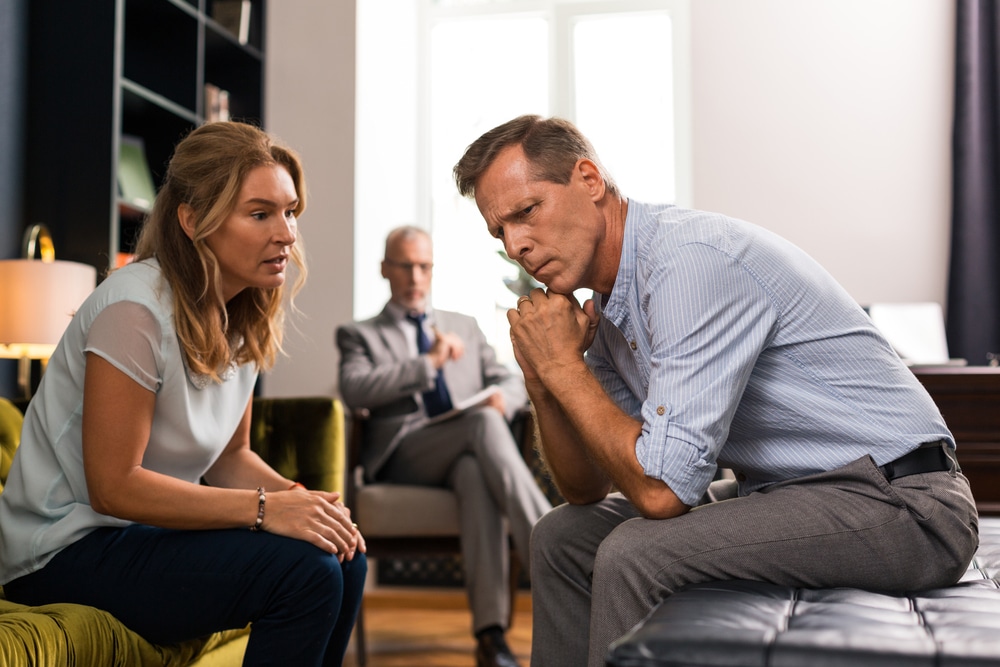
Therapy together. Calm wife talking to her husband during the session in the presence of a psychologist
Coping With Verbal Abuse and Compassion Fatigue: A Guide to Healing
Verbal abuse can have a profound impact on individuals, causing emotional and psychological distress. When combined with the pressures of providing compassionate care as a clinical psychotherapist, it can lead to a condition known as compassion fatigue. In this article, we will explore the effects of verbal abuse and compassion fatigue, and provide effective coping strategies to promote healing and self-care.
Verbal abuse encompasses a range of behaviors, including insults, criticism, belittlement, and humiliation. It can occur in various contexts, such as personal relationships, workplaces, or even within therapy sessions. The effects of verbal abuse can be long-lasting, leading to low self-esteem, anxiety, depression, and feelings of powerlessness. Recognizing the signs of verbal abuse is crucial for both individuals experiencing it and professionals providing support.
Clinical psychotherapists are dedicated to helping others, but their role often exposes them to emotional and psychological challenges. When faced with verbal abuse from clients or within their work environment, therapists may experience compassion fatigue. Compassion fatigue is characterized by a profound emotional exhaustion and a reduced ability to empathize or connect with others. It can diminish the therapist’s well-being and compromise their effectiveness in providing care.
To cope with verbal abuse and compassion fatigue, it is important to employ various strategies that promote healing and self-care. Self-awareness plays a crucial role in recognizing the signs of verbal abuse and compassion fatigue within oneself. Paying attention to emotional and physical cues that indicate distress and acknowledging the impact of these experiences on well-being is an important first step.
Seeking support is essential for clinical psychotherapists facing verbal abuse and compassion fatigue. Reaching out to trusted colleagues, supervisors, or mentors who can provide guidance and understanding is crucial. Participating in peer support groups or professional supervision sessions allows for the sharing of experiences and gaining insights from others in similar situations.
Establishing boundaries is another effective coping mechanism. Setting clear boundaries in professional and personal life helps protect oneself from verbal abuse. Communicating expectations clearly to clients and colleagues and assertively addressing any instances of mistreatment can contribute to creating a safer environment.
Practicing self-care is paramount in coping with verbal abuse and compassion fatigue. Engaging in activities that promote physical, emotional, and mental well-being is crucial. This can include exercise, meditation, pursuing hobbies, spending time with loved ones, and seeking therapy or counseling for oneself.
Reflecting and processing emotions is an important aspect of healing. Allowing oneself time and space to process the emotions stirred up by verbal abuse is crucial. Engaging in reflective practices, such as journaling or therapy, helps explore the impact and develop healthy coping mechanisms.
Developing resilience is key to overcoming the effects of verbal abuse and compassion fatigue. Focusing on strengths, cultivating a positive mindset, and developing healthy coping strategies contribute to building resilience. Practicing gratitude, engaging in mindfulness exercises, and seeking personal and professional growth opportunities are activities that foster resilience.
Coping with verbal abuse and compassion fatigue is a significant challenge for clinical psychotherapists. By understanding the effects of verbal abuse, recognizing signs of compassion fatigue, and implementing effective coping strategies, therapists can promote their own healing and well-being.
Remember, self-care and seeking support are essential in maintaining a healthy balance while providing compassionate care to others. Through these measures, therapists can navigate the complexities of their profession and continue to make a positive impact in the lives of their clients.
It is important to acknowledge that coping with verbal abuse and compassion fatigue is an ongoing process. Healing takes time, and it is essential to be patient with oneself. It is also crucial to monitor one’s own well-being and seek professional help if needed. A therapist or counselor can provide additional support and guidance tailored to individual needs.
In conclusion, verbal abuse and compassion fatigue can have detrimental effects on clinical psychotherapists. However, by recognizing the signs, seeking support, establishing boundaries, practicing self-care, reflecting and processing emotions, and developing resilience, therapists can cope with these challenges and promote their own healing. It is essential to prioritize self-care and remember that taking care of oneself allows for better care of others. By implementing these strategies, therapists can continue to provide compassionate care while maintaining their own well-being and preventing burnout.
The post Coping With Verbal Abuse and Compassion Fatigue: A Guide to Healing appeared first on Kevon Owen, Christian Counseling Clinical Psychotherapist.
